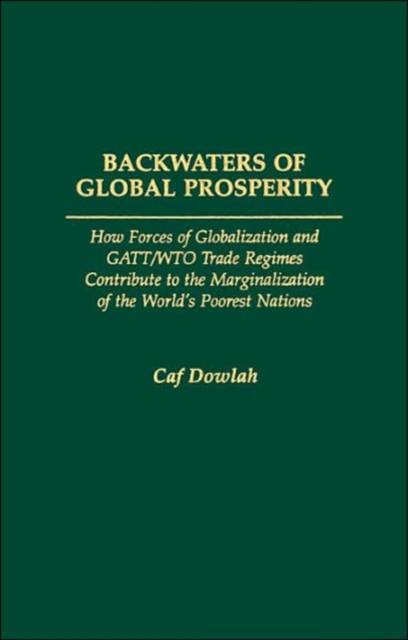
En raison d'une grêve chez bpost, votre commande pourrait être retardée. Vous avez besoin d’un livre rapidement ? Nos magasins vous accueillent à bras ouverts !
- Retrait gratuit dans votre magasin Club
- 7.000.000 titres dans notre catalogue
- Payer en toute sécurité
- Toujours un magasin près de chez vous
En raison de la grêve chez bpost, votre commande pourrait être retardée. Vous avez besoin d’un livre rapidement ? Nos magasins vous accueillent à bras ouverts !
- Retrait gratuit dans votre magasin Club
- 7.000.0000 titres dans notre catalogue
- Payer en toute sécurité
- Toujours un magasin près de chez vous
Backwaters of Global Prosperity
How Forces of Globalization and GATT/Wto Trade Regimes Contribute to the Marginalization of the World's Poorest Nations
Caf Dowlah
Livre relié | Anglais
161,45 €
+ 322 points
Description
From direct foreign investment to the flow of capital, there are endless factors that affect the economies of the world's poorest countries. Knowledge of the struggles of these countries--also known as the Least Developed Countries (LDCs)--is essential to understanding the impact of globalization. This work provides a platform for grasping why developed countries are reaping the benefits of globalization while the LDCs are being left behind.
Topical chapters seek to uncover the processes that LDCs should take to reverse their marginalization and build their economies so that they can receive the benefits of globalization. Subjects include: *The relationship between the World Trade Organization, World Bank, and the International Monetary Fund *Multilateral trade regimes *Tariff and non-tariff barriers in developed countries *Global Commodity Prices *Trends in Poverty and Human Development *TechnologySpécifications
Parties prenantes
- Auteur(s) :
- Editeur:
Contenu
- Nombre de pages :
- 199
- Langue:
- Anglais
Caractéristiques
- EAN:
- 9780275980436
- Date de parution :
- 30-11-04
- Format:
- Livre relié
- Format numérique:
- Genaaid
- Dimensions :
- 156 mm x 233 mm
- Poids :
- 462 g

Les avis
Nous publions uniquement les avis qui respectent les conditions requises. Consultez nos conditions pour les avis.






